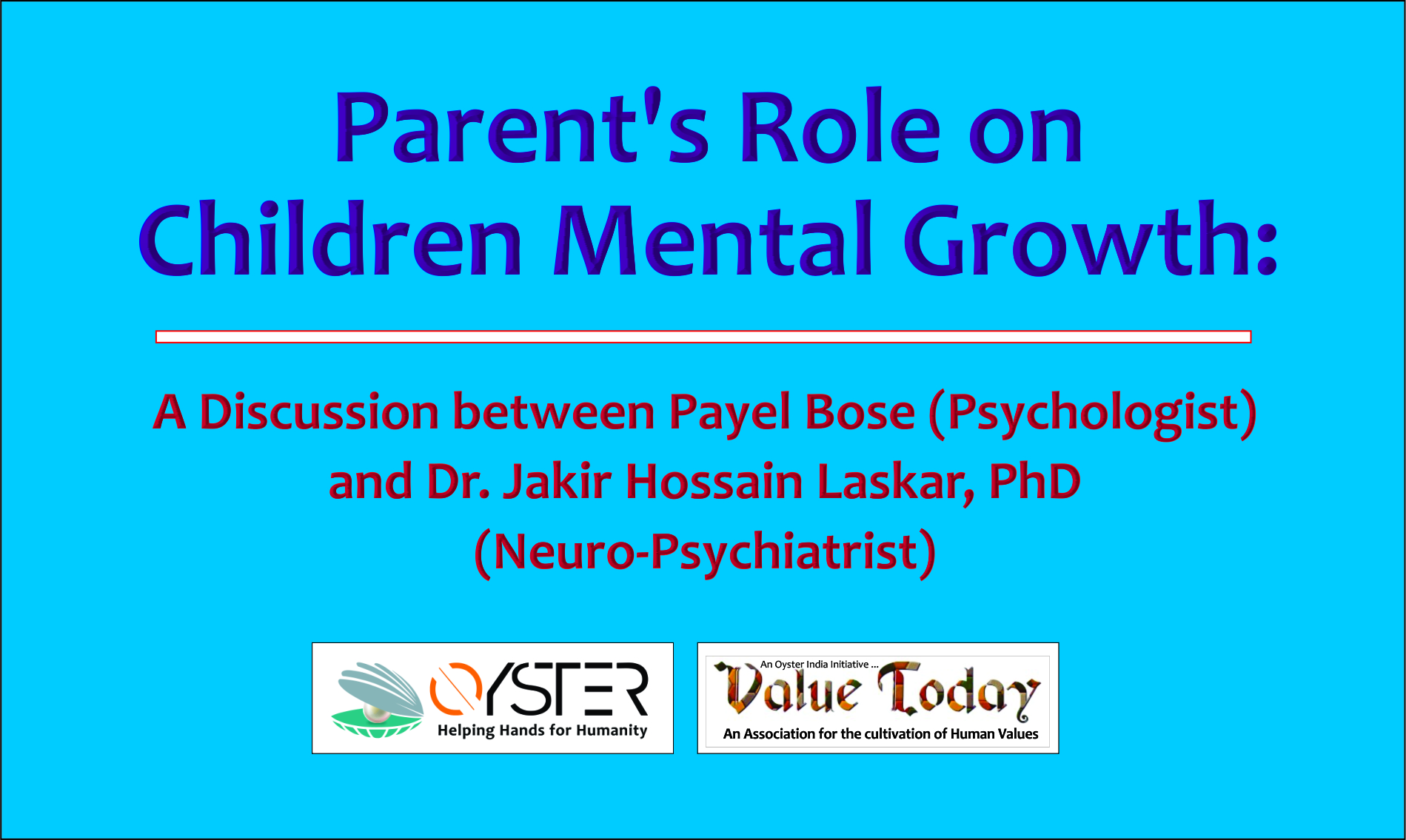Participants: Payel Bose & Dr. Jakir Hossain Laskar, PhD | Moderator: Dhruba Jyoti Das
Moderator (Dhruba Jyoti Das): Welcome, everyone, to this enlightening discussion on the role of parents in a child’s mental growth. Today, we are joined by Psychologist Payel Bose and Neuro-Psychiatrist Dr. Jakir Hossain Laskar. Let’s start by addressing the fundamental question: What is the significance of parents in shaping a child’s mental growth?
Payel Bose (Psychologist): Thank you for having us. Parents play a vital role in a child’s mental growth. From birth, children are highly influenced by their interactions with caregivers. Positive parenting practices, emotional nurturing, and a supportive environment are essential for fostering healthy emotional development. The relationships children have with their parents shape their self-esteem, emotional regulation, and social skills.
Dr. Jakir Hossain Laskar (Neuro-Psychiatrist): Absolutely, Payel. I’d like to add that parents also play a critical role in shaping a child’s brain development. During the early years, the brain undergoes rapid growth and is highly sensitive to environmental influences. Positive interactions, such as talking, playing, and responsive caregiving, stimulate neural connections that are crucial for cognitive and emotional development.
Moderator: It’s clear that parents have a profound impact on their child’s mental growth. Could you elaborate on specific parenting practices that contribute to nurturing a child’s emotional well-being?
Payel Bose: Certainly. A key practice is creating a safe and loving environment. Children need to feel secure and valued. This involves active listening, validating their feelings, and providing consistent emotional support. Encouraging open communication allows children to express themselves and learn healthy emotional expression.
Dr. Jakir Hossain Laskar: Alongside emotional support, parents should also focus on teaching coping skills. Children need to learn how to manage stress, frustration, and setbacks. Parents can model effective coping strategies and provide guidance on problem-solving. This equips children with resilience, a crucial skill for their mental well-being.
Moderator: It’s evident that both emotional support and teaching coping skills are essential. What about the role of parents in fostering a child’s cognitive development?
Payel Bose: Parents are a child’s first educators. Engaging in activities that stimulate cognitive growth is crucial. Reading to children, providing educational toys, and encouraging curiosity-driven exploration can greatly enhance their cognitive abilities. Parents should also nurture a growth mindset by praising effort and encouraging a positive attitude towards learning.
Dr. Jakir Hossain Laskar: Additionally, monitoring screen time is crucial in today’s digital age. Excessive screen time can interfere with cognitive development and contribute to attention and behavior issues. Parents should ensure a healthy balance between screen-based activities and other forms of cognitive stimulation.
Moderator: Thank you both for highlighting these valuable insights. Could you discuss the importance of parents in shaping a child’s social and behavioral development?
Payel Bose: Parents play a significant role in teaching children social skills such as empathy, cooperation, and conflict resolution. By modeling respectful behavior and facilitating positive interactions with peers, parents help children build healthy relationships and navigate social situations effectively.
Dr. Jakir Hossain Laskar: I’d like to emphasize the role of consistency and structure. Establishing clear rules and routines helps children develop a sense of predictability and security. This, in turn, contributes to better behavior and emotional regulation.
Moderator: Fantastic points. Lastly, how can parents identify and address abnormal behavior or signs of potential mental health issues in their children?
Payel Bose: Parents should remain vigilant for sudden or persistent changes in behavior, mood, or social interactions. These could be indicators of underlying issues. If concerned, seeking professional guidance from psychologists or psychiatrists is crucial. Early intervention can prevent more serious problems later in life.
Dr. Jakir Hossain Laskar: Exactly. Early detection and intervention are key. Parents should foster an open and non-judgmental environment where children feel comfortable discussing their feelings. Professional assessment can provide clarity and guidance on the appropriate steps to take.
Moderator: Thank you both for this insightful discussion on the pivotal role parents play in a child’s mental growth. Your expertise is truly invaluable in understanding how parents can positively influence their children’s well-being.
As we wrap up, it’s clear that parents have a profound impact on their child’s emotional, cognitive, social, and behavioral development. Their nurturing, guidance, and support lay the foundation for a child’s mental growth, shaping their lifelong well-being. We appreciate your time and expertise today.
